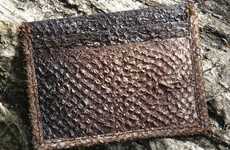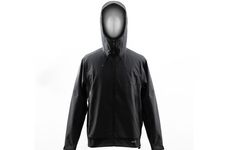
MIT's Fishy Innovation
We've seen fish scale bikinis, but now MIT researchers think they can create a protective armor based on the scales of fish.
Fish scales protect fish from getting attacked by other creatures of the sea, but as anyone who's ever touched a fish knows, they're also very light weight.
Applying the same concept for a light weight human armor is exactly what MIT researchers are hoping to do. In contrast to armors people have traditionally worn, fish scales are made up of tiny individual sections, allowing great flexibility.
MIT studied Gray bichir, or Polypterus senegalus, a long, eel-like, shallow fresh water fish from Africa, seen in the gallery.
While the MIT project was funded by the U.S. Army, the designs below certainly were not!
Fish scales protect fish from getting attacked by other creatures of the sea, but as anyone who's ever touched a fish knows, they're also very light weight.
Applying the same concept for a light weight human armor is exactly what MIT researchers are hoping to do. In contrast to armors people have traditionally worn, fish scales are made up of tiny individual sections, allowing great flexibility.
MIT studied Gray bichir, or Polypterus senegalus, a long, eel-like, shallow fresh water fish from Africa, seen in the gallery.
While the MIT project was funded by the U.S. Army, the designs below certainly were not!
Trend Themes
1. Fish Scale Armor - Disruptive innovation opportunity: Develop a lightweight and flexible armor for human use based on the structure of fish scales.
Industry Implications
1. Military Technology - Disruptive innovation opportunity: Explore the use of fish scale armor in military applications to provide lightweight protection for soldiers.
2.2
Score
Popularity
Activity
Freshness























